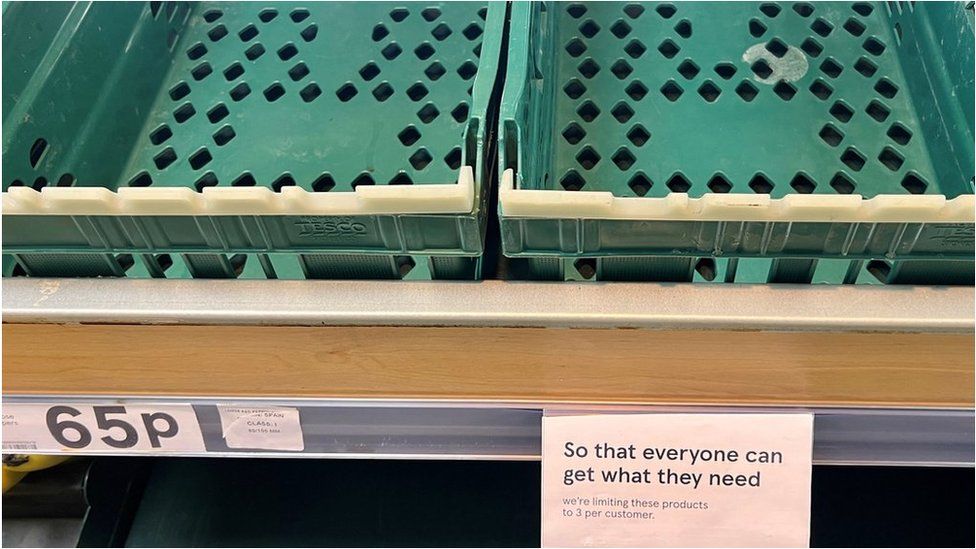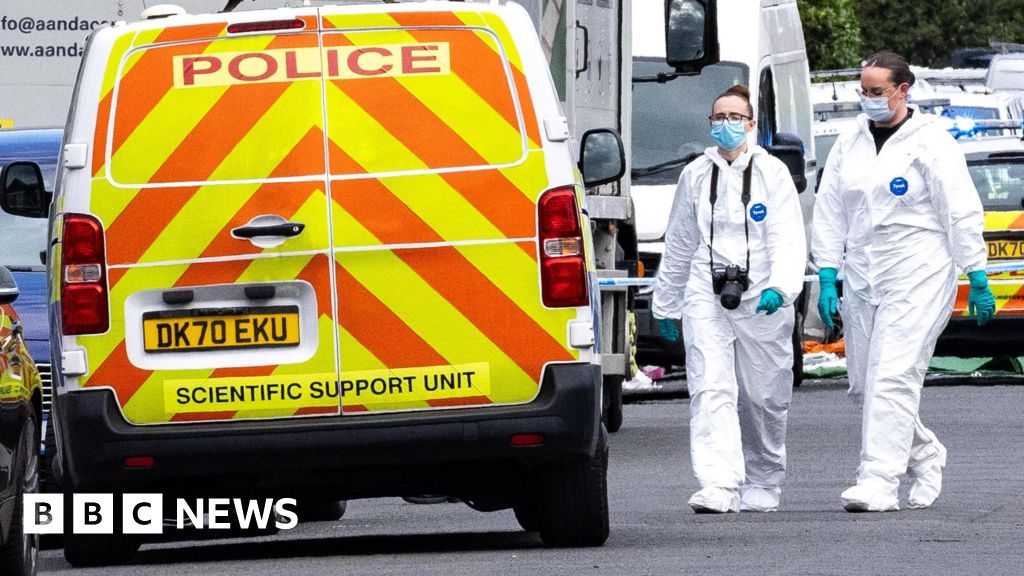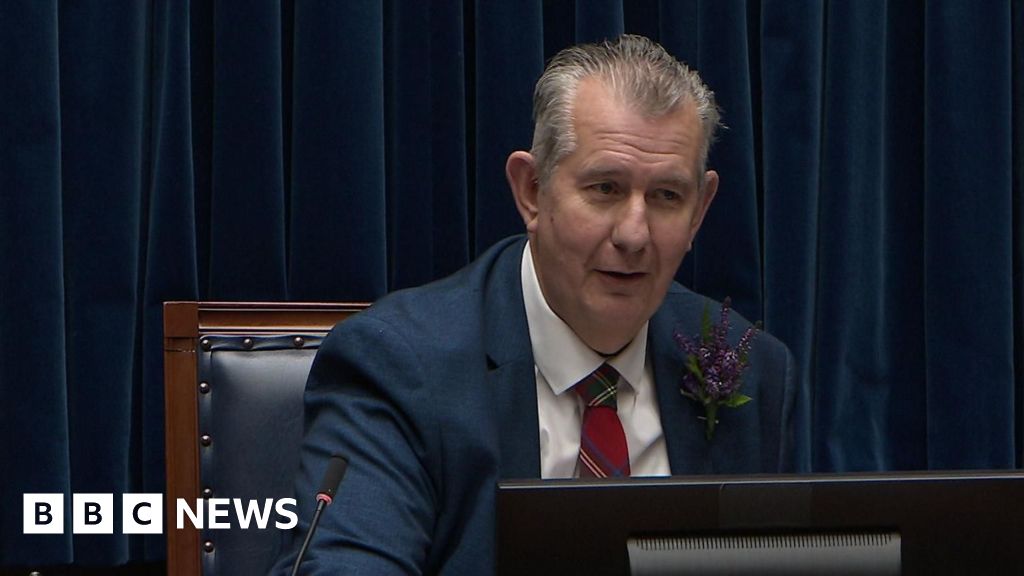ARTICLE AD BOX
 Image source, Reuters
Image source, Reuters
By Reality Check team
BBC News
Some of the UK's biggest supermarkets are limiting sales of tomatoes and other salad items.
The government says the shortages, which are expected to last for several weeks, have been "predominantly caused by poor weather in Spain and North Africa where they are produced".
Others highlight the impact of high energy prices on UK growers, whether the government has done enough to help them and supermarket pricing.
Lots of people on social media have also been posting pictures of empty shelves in the UK and contrasting them with plenty of fresh produce in supermarkets in Europe, claiming Brexit is a factor.
Skip twitter post by Alex Taylor
So I went to my local supermarket and yes ! THESE ARE ACTUAL PICTURES, LIVE, OF REAL TOMATOES !!! chez my local @Leclerc !
I quizzed the (somewhat taken aback) person in charge of fruit and veg, asking her if she had noticed any shortages of fruit/veg - "surtout des tomates ?" 2 pic.twitter.com/1i5uVSME6J
The BBC is not responsible for the content of external sites.
So, what is the evidence for this?
What are supplies like in Europe?
The European Commission (EC) told us that "there is no particular situation of food shortage in EU agricultural markets".
The Spanish government did confirm that "supplies in Spain are currently lower".
It said this was largely due to the weather: "unusually high temperatures from the end of the summer period until December"... followed by a "sudden arrival of low temperatures in January... resulted in a drop in supply".
There have been some shortages in the Republic of Ireland, another European Union (EU) member, and Irish retailers have blamed freezing weather in Southern Europe and North Africa. But none are rationing fruit and vegetables.
How is Brexit affecting tomato imports from the EU?
EU countries are in the single market - a giant, free-trade zone where countries share the same rules and regulations.
Confused by Brexit jargon? Reality Check unpacks the basics.
The UK is no longer in the single market and now has a rule that every consignment of "plant products" - such as tomatoes - sent from the EU to the UK, requires customs declarations and pre-notification on the government's IT system.
It produced a video on how to do this, using an example of someone trying to import tomatoes.
The government says the paperwork is not routinely checked but, from 2024, there will be further paperwork and checks.
A government video shows the steps the character called Ali has to take to import tomatoes from Spain.
We spoke to MCE Logistics, a company which processes these forms for dozens of importers of Spanish tomatoes for British supermarkets.
It told us it takes around 10-20 minutes to do this per lorry - longer if they are transporting mixed loads of vegetables - and they use specialised software.
Guy Singh-Watson who runs the Riverford veg box company, and has farms in England and France, blames "Brexit paperwork" for the shortages.
Brexit represents "a challenge for the entire Spanish fruit and vegetable sector", according to the Spanish government.
But it said the current tomato shortages in the UK were "due to the weather reasons mentioned, and not to Brexit".
We asked the European Commission whether Brexit was a factor. It did not comment on this, but said "food prices and trade flows are driven by market forces".
One person on social media highlighted the situation in the Netherlands, another source of tomatoes for the UK.
They quoted 'Daniel' saying: "I live in the Netherlands. We have too many tomatoes! We used to export them to the UK but it now takes a truck driver 77 hours of queueing to take tomatoes to the UK and all truck drivers simply refuse."
Skip twitter post 2 by lucy woods
Daniel: I live in the Netherlands. We have too many tomatoes! We used to export them to the UK but it now takes a truck driver 77 hours of queueing to take tomatoes to the UK and all truck drivers simply refuse. So now we have cheap abundant tomatoes here in the Netherlands. pic.twitter.com/956CUEdsQO
— lucy woods (@LucyWoodslucy70) February 22, 2023The BBC is not responsible for the content of external sites.
We contacted the industry associations in the Netherlands as well as the haulage company pictured in the tweet.
The company has not got back to us and the industry association said they were "not aware of queuing at the ports in the Netherlands for goods leaving to or entering from the UK".
Ksenija Simovic, a senior policy adviser at Copa-Cogeca, a group which represents farmers and farming co-operatives in the EU, said when there is a shortage of supply "it doesn't help that the UK is out of the EU and single market".
"But I don't think this is the primary reason the UK is having shortages," Ms Simovic added.
We asked the UK government if Brexit was a factor but it did not address this point.
It said farming minister Mark Spencer had spoken to UK retailers and "...asked them to look again at how they work with our farmers and how they buy fruit and vegetables".
What about the UK's tomato producers?
Of all the tomatoes eaten in the UK - about 500,000 tonnes a year - UK growers produce a fifth or 100,000 tonnes.
During the summer, this goes up to around half of all tomatoes bought.
There have been shortages of seasonal farm workers, including in the glasshouses where tomatoes are grown, that have been blamed on Brexit and the pandemic.
The government's Seasonal Workers visa scheme allows workers to stay for six months at a time. Before Brexit, they could come and go - from other EU countries - as part of freedom of movement rules. Now they come from countries as far away as Nepal.
Seasonal workers Buddi Bahadur Khatri (l) and Bal Kumar Khatri (r) came from Nepal to work in glasshouses last year.
Dr Sarah Schiffling, a supply chain expert from the Hanken School in Helsinki, told us the season for growing tomatoes in UK glasshouses is about nine months a year. A six-month visa means recruiting and training two sets of workers, adding to the paperwork and cost.
In addition, visas are granted only if workers earn at least £10.10 for each hour worked - 60p more than the current National Minimum Wage.
Dr Schiffling highlighted differences in pricing strategies between UK and EU supermarkets which, she argued, has been a factor in the current tomato shortages.
"The pricing strategies of some supermarkets in the UK tie producers into longer-term contracts while the EU supermarkets use spot rates - when there are fewer tomatoes the price goes up", she told BBC 5 Live.
What about tomatoes from Morocco?
More than a third of tomatoes eaten in the UK currently come from Morocco.
Growers there have been affected by unusually cold night-time temperatures that affected tomato ripening.
Bad weather also led to the cancellations of ferries bringing supplies to the European mainland over the past three to four weeks.
After Brexit, the UK signed a trade continuity agreement with Morocco (replicating the trade deal the UK had with the country as an EU member).
In March 2022, Poole Harbour announced a new direct service connecting the UK and Morocco would be launched "shortly".
It said it would provide "an alternative route for exporters from Morocco and Africa currently using road networks to the UK via Europe". But the route has not been launched.
We contacted officials at Poole but have not had a reply.

 1 year ago
20
1 year ago
20








 English (US) ·
English (US) ·